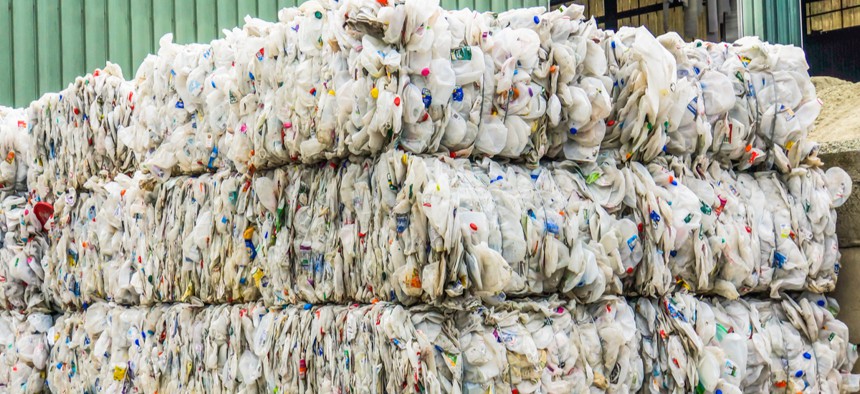Combating China's Recycling Reversal

Strategies include separating recycling streams to minimize contamination. shutterstock
City leaders have multiple options to cope with new waste regulations in China, which previously processed a lot of this country's recycling, according to a National League of Cities report.
City leaders can combat China’s stringent waste regulations by working with contractors, exploring new markets and separating recycling streams in local waste management systems, according to a new report from the National League of Cities.
The report, “Rethinking Recycling: How Cities Can Adapt to Evolving Markets,” highlights short- and long-term strategies for cities to revamp local waste management systems to avoid financial losses in the wake of new import bans and contamination limits implemented by China this year.
“In the face of adversity, city leaders have historically been our nation’s problem-solvers,” Clarence Anthony, the National League of Cities’ CEO and executive director, said in a statement. “China’s new policy is a wake-up call that we need to think more critically about waste management, and cities now have the opportunity to strengthen domestic markets and chart a sustainable path forward.”
In January, China implemented a ban on certain commodity mixes, and in March began enforcing “stricter limits on how much contamination can be present in recyclable materials,” the report says. That ban specifically targeted mixed paper and mixed plastics, the two most common types of materials processed by municipal recycling systems.
The policy is not an outright ban on all recycling imports, but “the contamination limits of .5 percent are so low that no American processor can realistically meet them,” the report says. “Since China previously received more than half the world’s recyclable commodity exports, the move has unsettled global recycling.”
Local governments are now dealing with stockpiles of recyclables and seeing lower revenues. Commodities, including mixed paper, that previously brought in revenue—anywhere from $80 to $100 per ton—are now a cost liability. Some haulers, the report says, “have resorted to paying $18 to $20 per ton to take their mixed paper.” And virtually all processors now receive lower prices for commodities.
“All of these costs will eventually be passed to cities and their residents,” the report predicts.
Short-term coping strategies for cities include slowing processing times to decrease contamination in an attempt to comply with China's new rules, incinerating materials or placing them in landfills, and ramping up education and outreach efforts to teach citizens which materials are recyclable in a given municipality.
The report also recommends that cities consider requiring residents to separate their recycling streams—plastic, glass and metal containers in one bin, paper in another—which “helps keep the paper stream clean so it can maintain its value.” That strategy is effective and can work in the long term, but requires a substantial up-front investment, the report says.
Other long-term strategies include conducting an economic analysis of current waste management operations, working with contractors to fine-tune agreements, ensuring that fees and rates reflect current costs and exploring “local and unconventional markets,” including domestic markets.
“Cities can also use policy, such as tax breaks and recycled materials minimums in procurement, to incentivize and accelerate the creation of these new markets,” the report says.
Kate Elizabeth Queram is a Staff Correspondent for Government Executive’s Route Fifty and is based in Washington, D.C.
NEXT STORY: Will It Ever Stop Raining?





